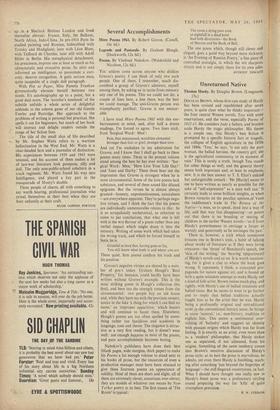Unreturned Native
DOUGLAS BROWN, whose first-rate study of Hardy has been revised and republished after seven years, is quite clear what he thinks important— the four central Wessex novels, Tess with some reservations, and the verse, especially Poems of 1912-13. He considers Jude a failure, and brushes aside Hardy the tragic philosopher. His theme is a simple one, that Hardy's best fiction is prompted by a specific historic fact or tragedy, the collapse of English agriculture in the 1870s and 1880s. 'Tess,' he says, 'is not only the pure woman, the ballad heroine, the country girl; she is the agricultural community in its moment of ruin.' This is surely a truth, though Tess stands for other things as well; and the general theory seems both important and, at least in emphasis, new. It is the best answer to T. S. Eliot's unkind but unforgettable remark : 'He [Hardy] seems to me to have written as nearly as possible for the sake of "self-expression" as a man well can.' It certainly leads to some brilliant insights, as when Brown remarks on the peculiar aptness.of Venn the reddleman's trade in The Return of the Native—`a man, so to speak, dyed into a way of life, and that way fast disappearing'—or points out that there is no breeding or rearing of children in the earlier Wessex novels—`as if from Hardy's powerlessness to envisage a future as warmly and generously as he envisages the past.'
There is, however, a trick which sometimes irritates one in Brown's style, a habit of talking about works of literature as if they were living creatures—the 'thrust' of Henchard's speech, the `skin of the writing,' the 'bearing' (deportment) of Hardy's novels and so on. It is worth mention- ing, for it gives a clue to where the book goes wrong. It represents, I think, a concealed pro- paganda for nature against art, and is bound up with a quite mistaken attempt to make Hardy out a kind of folk-artist. Brown makes much play, and rightly, with Hardy's use of ballad situations and ballad tunes. But he seems to want to go further and to imply that ballad traditions actually taught him to be the artist that he was. Hardy being a profoundly original and untraditional artist in the conventional literary sense, he brings in some 'natural,' i.e., non-literary, tradition to explain .him. This seems a sentimental over- valuing Of 'balladry' and suggests an identity with peasant origins which Hardy was far from feeling. It is exactly as an artist, even more than as a 'modern' philosopher, that Hardy strikes one as separated, if not alienated, from his origins. Something of the same tendency comes into Brown's sensitive discussion of Hardy's prose style; at its best the prose is marvellous, he admits, yet even there Hardy is fumbling, reach- ing after something 'just beyond the fingertips of language'—the stiff-fingered countryman, in fact. What I should have thought one really saw in Hardy's finest prose was a preliminary circling round preparing the way for 'kills' of quite triumphant precision.
P. N. EMBANK














































 Previous page
Previous page